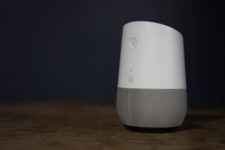Thinking of Getting a Digital Assistant Device? Think Again

According to recent data, nearly 6 million Australians own digital assistant devices (DADs) like Google Home, Amazon Alexa and Amazon Echo. And it’s easy to understand why – for as little as a couple of hundred dollars, these cool little gadgets can accurately answer almost any question you can think of. They can make play music, control your TV and even make phone calls.
But last year in the United States, concerns about privacy came to the fore when an Amazon Alexa device recorded a couple’s private conversation and sent it as a message to one of their acquaintances.
The incident came as a reminder that technology – no matter how amazing, can interfere with our private lives.
ACCC warning
The Australian Competition and Consumer Commission (ACCC) released its digital platforms inquiry report last month, and many were stunned about the amount of personal data tech giants like Google, Amazon and Facebook are collecting, storing and even selling.
In the wake of the report, ACCC Chairman Rod Sims told the media “there’s no way in the world I would have Google Home or the equivalents in my home”.
“Why do I want a device listening to everything I say?”, Mr Sims stated, adding that most people that have gone through the report are ‘outraged’ about the conduct of tech giants when it comes gathering and using personal data.
He qualified his statement by saying, “If people, once they are aware, want to have these devices in their home then that’s obviously perfectly fine.”
“But they need to know in really clear terms – which they don’t now and I don’t know either – how much information is going back to home base, what exactly is being done with it and who it’s going to.”
“They need to know all that.”
Mr Sims says the public is often naïve when it comes to new technologies like DADs, warning that their ability to intrude into our privacy is more pervasive than most can imagine.
Harvesting data
While most internet juggernauts claim they’re collecting personal data to ‘enhance user experience’, a number of recent scandals suggest the reasons behind data collection are not so benign.
Facebook caused a global scandal last year when it was revealed that the personal data of around 50 million users was harvested by a company called Cambridge Analytica and used to send personalised political advertisements, with a view to influencing the United States election in favour of the Trump campaign.
One of the problems is that most of us agree to update software and download apps without going through the mountain of terms and conditions, some of which make clear our data can be used for just about anything.
As comedian Michael McIntyre once famously quipped in a comedy skit about adapting to life online: “I am slightly worried that in five years or so, iTunes is going to turn up on my doorstep and say ‘we own this house now’.”
Your ‘right to privacy’ doesn’t exist
But it is no laughing matter because in Australia, there is no right to privacy, and the Privacy Act has long been criticised for failing to provide any meaningful protections against the unauthorised use of personal information.
In 2018, the federal government enacted laws requiring businesses with a turnover of more than $3 million to inform customers of data breaches. These laws are intended to bring Australia closer in line with European Union standards, but there’s still a long way to go, and part of the problem is that our use of technology is escalating at a pace faster than the law can keep up.
A range of technologies including facial and voice recognition software have also raised concerns about wholesale privacy intrusions by both businesses and the state, including the potential misuse of personal data.
Role of the ACCC
While the ACCC has a role in helping all of us to understand what data is being collected, we need to rely on the law when something goes wrong.
Among almost two dozen recommendations from the ACCC’s digital platforms inquiry final report is toughening the Privacy Act including harsher financial penalties as well as strengthening consent requirements.
If these are adopted they will give consumers more clarity and certainty about what information they need to share, and how it is being used. And this is critical, not just as we all use technology more and more, but as the government and companies we deal with also embrace it.
Legal action
Earlier this year, the ACCC launched legal action against the website HealthEngine over its sale of personal data such as names, home addresses, birthdates and even clinic visits.
The Commission has major concerns about how much information Facebook and Google are gathering about each and every one of us as we go about our daily lives, and how they are using this information. The fact devices like Google Home are actually planted inside our households, where we engage in our most private conduct and conversations, is particular cause for concern.
The potential for DADs to collect private information is unlimited – a little like ‘Big Brother’ on telescreens inside homes as described by George Orwell in his fictional yet prophetic work 1984.
So we need to ask ourselves, is having a super-cool device in our homes worth risking our privacy?







